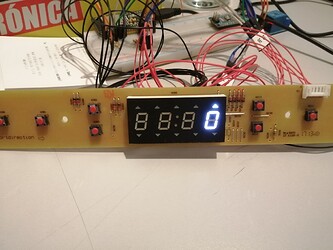That's the simple version of my question... Here's the more detailed version:
I'm using a 4 digit sev seg display to display one of two possible values, stored in an array of integers. These values can be from 0-9950. Everything now works, but the problem I have is that the display I'm using has small marker arrows instead of decimal points, which I want to use as well, but because they are effectively the dp, one value will display as "0000" while the other displays as "0".
I've discovered from my searching so far that I can't simply add leading zeros to the second int, so I think the only way to make it display the same for both (either both as 0, or both as 0000, I don't mind but would like them to look the same) would be to convert them to char arrays somehow and use sevseg.setChars instead of setNumber. But how do I convert an int of "1234" to char of either "1.234" or "1234." depending on which value is being shown?
Here's the code:
#include <SevSeg.h>
#include <Bounce2.h>
// CONSTANTS
// Define number of buttons and pins attached to
const byte numModes = 2;
const byte modePins[numModes] = { 36, 39 }; // { SP(defrost), SN(steam) } !!!EXTERNAL PULLUP!!!
const byte plusPin = 34; // { plus, minus }!!!EXTERNAL PULLUP!!!
const byte minusPin = 35; // { plus, minus }!!!EXTERNAL PULLUP!!!
const byte startPin = 32;
const byte doorPin = 33;
// Define relay and buzzer pins
const byte relayPin = 13;
const byte buzzerPin = 23;
// Define LED display pins
const byte numDigits = 4;
const byte digitPins[] = { 12, 14, 27, 26 };
const byte segmentPins[] = { 15, 2, 0, 4, 16, 17, 5, 18 }; //Segments: A,B,C,D,E,F,G,Period
const byte dp[numModes] = { 3, 0 };
// Correct solutions
const int correctValues[numModes] = { 750, 3200 };
// Set the segments for "door" on the display
uint8_t displayDoor[4] = { 0x5E, 0x5C, 0x5C, 0x50 };
// Time in seconds to cook for
int cookTime = 11;
int holdTime = 800;
// GLOBAL VARIABLES
int currentValues[numModes] = { 0, 0 };
byte currentMode = 0;
unsigned long holding = 0;
unsigned long cooking = 0;
// CREATE INSTANCES
SevSeg sevseg;
Bounce2::Button modeButtons[numModes] = { Bounce2::Button(), Bounce2::Button() };
Bounce2::Button plusButton = Bounce2::Button();
Bounce2::Button minusButton = Bounce2::Button();
Bounce2::Button startButton = Bounce2::Button();
Bounce2::Button door = Bounce2::Button();
bool isSolved() {
bool valuesSolved = true;
for (int i = 0; i < numModes; i++) {
if (currentValues[i] != correctValues[i]) {
valuesSolved = false;
}
}
return valuesSolved;
}
bool timePeriod(unsigned long& startPeriod, unsigned long time) {
unsigned long currentTime = millis();
if (currentTime - startPeriod >= time) {
startPeriod = currentTime;
return true;
} else return false;
}
void setup() {
// put your setup code here, to run once:
// Setup sevseg
sevseg.begin(COMMON_ANODE, numDigits, digitPins, segmentPins);
sevseg.setBrightness(50);
sevseg.blank();
// Setup Buttons
for (int i = 0; i < numModes; i++) {
modeButtons[i].attach(modePins[i], INPUT);
modeButtons[i].setPressedState(LOW);
}
plusButton.attach(plusPin, INPUT);
plusButton.setPressedState(LOW);
minusButton.attach(minusPin, INPUT);
minusButton.setPressedState(LOW);
startButton.attach(startPin, INPUT_PULLUP);
startButton.setPressedState(LOW);
door.attach(doorPin, INPUT_PULLUP);
door.setPressedState(LOW);
// Setup relay and buzzer pins
pinMode(relayPin, OUTPUT);
digitalWrite(relayPin, HIGH);
pinMode(buzzerPin, OUTPUT);
digitalWrite(buzzerPin, LOW);
}
void loop() {
// put your main code here, to run repeatedly:
// check for mode change
for (int i = 0; i < numModes; i++) {
modeButtons[i].update();
if (modeButtons[i].pressed()) {
currentMode = i;
}
}
// update plus button and act upon outcome
plusButton.update();
if (plusButton.pressed() && currentValues[currentMode] < 9950) {
currentValues[currentMode] += 50;
holding = millis();
digitalWrite(buzzerPin, HIGH);
digitalWrite(buzzerPin, LOW);
}
if (plusButton.isPressed() && currentValues[currentMode] < 9950) {
if (millis() - holding > holdTime) {
currentValues[currentMode] += 50;
holding = millis();
if (holdTime > 50) {
holdTime /= 1.5;
}
}
} else if (plusButton.released()) {
holdTime = 800;
}
// update minus button and act upon outcome
minusButton.update();
if (minusButton.pressed() && currentValues[currentMode] > 0) {
currentValues[currentMode] -= 50;
holding = millis();
}
if (minusButton.isPressed() && currentValues[currentMode] > 0) {
if (millis() - holding > holdTime) {
currentValues[currentMode] -= 50;
holding = millis();
if (holdTime > 50) {
holdTime /= 1.5;
}
}
} else if (minusButton.released()) {
holdTime = 800;
}
// set display to current mode and value
sevseg.setNumber(currentValues[currentMode], dp[currentMode]);
sevseg.refreshDisplay();
// update start button and check for correct solution
startButton.update();
if (startButton.pressed()) {
if (isSolved()) {
door.update();
while (!door.isPressed()) {
sevseg.setSegments(displayDoor);
sevseg.refreshDisplay();
door.update();
}
onSolve();
} else {
for (int i = 0; i < numModes; i++) {
currentValues[i] = 0;
}
currentMode = 0;
}
}
}
void onSolve() {
digitalWrite(relayPin, LOW);
if (timePeriod(cooking, 1000)) {
cookTime--;
}
sevseg.setNumber(cookTime);
sevseg.refreshDisplay();
if (cookTime > 0) {
onSolve();
} else if (cookTime == 0) {
digitalWrite(relayPin, HIGH);
sevseg.blank();
for (int b = 0; b < 3; b++) {
digitalWrite(buzzerPin, HIGH);
delay(500);
digitalWrite(buzzerPin, LOW);
delay(500);
}
for (int i = 0; i < numModes; i++) {
currentValues[i] = 0;
}
currentMode = 0;
cookTime = 11;
}
}

